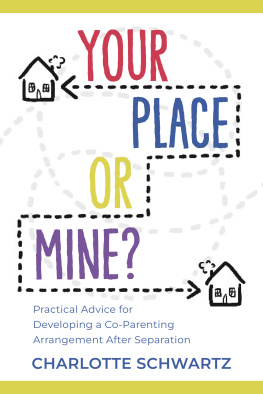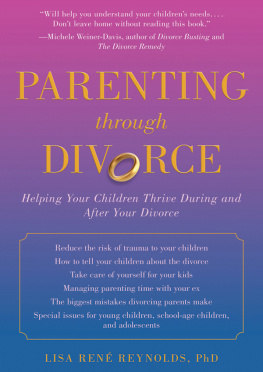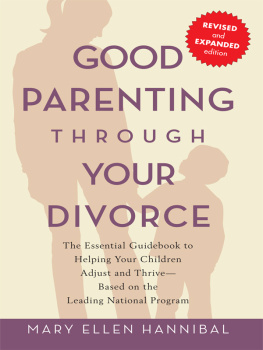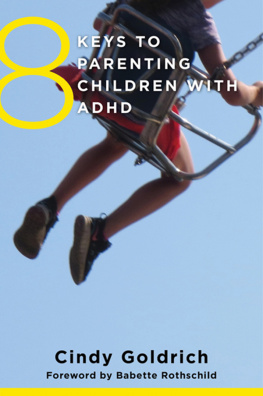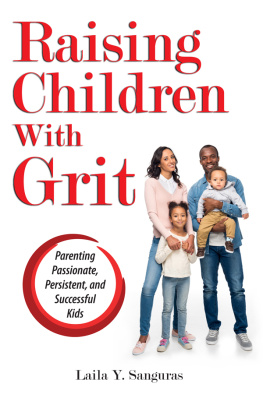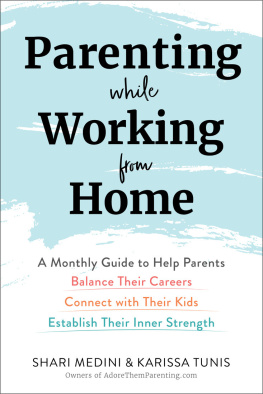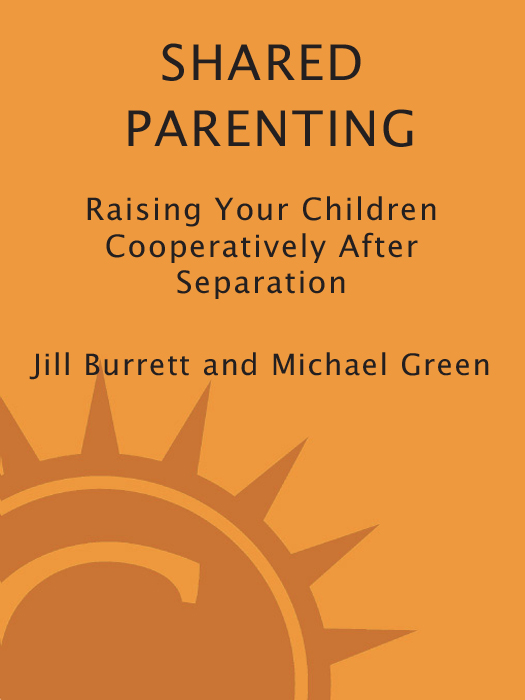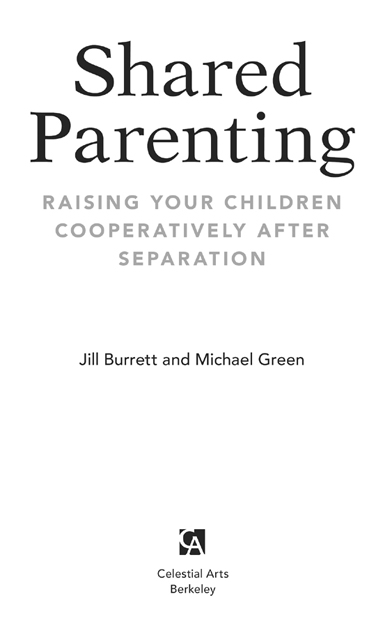Advance praise for this book
If you are divorcing, one of the best things you can do for your children is to read this book. Children need two involved, well-functioning parents, but this is hard for parents to do without help. Green and Burretts little book provides all the advice, help, and encouragement you need. A treasure trove of ideas and wisdom.
Sanford L. Braver, PhD, author of Divorced Dads: Shattering the Myth
Shared Parenting is eminently readable, chock filled with practical suggestions about how to examine your own assumptions and reactions, consider your ex-spouses, and keep your children at the heart of every decision. The authors have clearly been around the block a few times and have listened carefully to the feelings and concerns of moms, dads, and children.
Marsha Kline Pruett, PhD, MSL, coauthor of Partnership Parenting: How Men and Women Parent Differentlyand How It Can Help Your Kids and Your Marriage
Shared Parenting is a blueprint for divorcing parents to use as they try to figure out the next steps of being parents. It is full of helpful hints, probing questions and answers, and is highly readable and engaging. It serves as a tremendously useful guide to rebuilding relationships post-divorce. Any parent going through a divorce can learn from it.
Shared Parenting encourages mothers and fathers to refocus their attention away from the negatives of divorce toward the positives of co-parenting, with the clear focus on the best interests of the children. This book is highly useful in asking and answering the questions all parents must consider as they develop a new family plan and dynamic to ensure that the children do not lose either parent and that their childrens needs are paramount.
Jody Mosten, PhD, clinical psychologist, Los Angeles
This book should be compulsory reading for all separating parents. We know children cope best with a family breakup when their parents work together to share their care. But it isnt easy. Burrett and Green have the experience and knowledge to provide practical advice that gives parents a very valuable blueprint for making it happen.
Bettina Arndt, social commentator in Sydney
An eminently practical and sensible guide that helps parents keep their childrens needs front and center while working out the details of post-divorce life. This book provides essential information in a user-friendly format. Read this book, apply its advice, and you will give your children an enormous advantage in coping with separation and divorce.
Dr. Richard A. Warshak, Clinical Professor, University of Texas Southwestern Medical Center, author of Divorce Poison: Protecting the Parent-Child Bond from a Vindictive Ex
The authors of Shared Parenting share both their professional and personal experiences and knowledge in the area of parenting and families. Their practical style of writing gives parents real situations to think about and the practical tools to find ways to really share the parenting and to continue meaningful relationships with their children after the breakup.
This is a must-read for any parent contemplating separation and divorce or for those already in the process. Its never too late to reconnect with your children. The short- and long-term benefits for parents and children far outweigh any immediate difficulties. You and your kids deserve this.
Judy Radich, National President, Early Childhood Australia
Research all over the world has shown that it is best for children to have both parents actively involved in their lives despite the parents separation, except where there is child abuse, ongoing violence, or intractable conflict. This book is an excellent resource for people who want to understand how best to put the children first and to work out cooperative, shared parenting arrangements after separation. It is full of useful information, practical wisdom, and sensible advice. I recommend it very highly.
Patrick Parkinson, Professor of Law, University of Sydney
Negotiating parenting time following separation is complex and emotional, and often a source of ongoing conflict. This book offers practical solutions focused on childrens needs, while challenging some traditional assumptions about parenting after separation.
Anne Hollonds, CEO, Relationships Australia (NSW)
Copyright 2006, 2009 by Jill Burrett and Michael Green
All rights reserved.
Published in the United States by Celestial Arts, an imprint of the Crown Publishing Group, a division of Random House, Inc., New York.
www.crownpublishing.com
www.tenspeed.com
Celestial Arts and the Celestial Arts colophon are registered trademarks of Random House, Inc.
Library of Congress Cataloging-in-Publication Data
Burrett, Jill F.
Shared parenting : raising your children cooperatively after separation / Jill Burrett and Michael Green. 1st American ed.
p. cm.
Originally published: Sydney, Australia : Finch Pub., 2009.
Summary: A guide for separated or divorced parents who want to develop a cooperative, child-focused parenting approach, with advice about communicating effectively, devising a shared parenting plan, establishing joint involvement, and more Provided by publisher.
eISBN: 978-0-307-80815-8
1. Parenting, Part-time. 2. Children of divorced parents. I. Green, Michael, 1939II. Title.
HQ777.5.B87 2009
649.1dc22
2009019727
Originally published in Australia by Finch Publishing Pty Ltd.
v3.1
Contents
Introduction
Shared parenting is the new way to look at parenting after separation and divorce. In many countries (including the United Kingdom, the United States, New Zealand, Canada, and Australia) cooperative shared parenting has for decades been rightly regarded as the best way of ensuring children of divorced parents adjust well to family change, so in many ways its actually nothing new. But because for so long its been presumed that dads either cant or dont want to be involved more often than one weekend every other week (and even that they arent sufficiently competent to do more!), equal shared parenting seems new, challenging the assumption that upon separation children live with one parent or the other. For far too long theres been a misguided belief that children, especially those under ten, are better off with mothersand this has helped to spawn another (hotly debated) belief: that the legal system disadvantages fathers.
We believe that this situation has seriously disadvantaged children, and that fathers should be more engaged with their children than they have been. This requires real time, just as most mothers have always knownand have given. We also believe that, for a very long time, gender stereotypes, the system, and other complex prejudices have discouraged some fathers and caused others to participate little in parenting, especially after separating.
We dont think that one-weekend-every-other-week parenting is meaningful shared parenting. Shared parenting means being engaged with your children for a flexible 35 to 50 percent or more of their available time.
Studies on separated parenting are currently being conducted in many countries and focus particularly on whether there should be a presumption that equal shared parenting be the norm. Mostly, research has been unable to provide clear answers that would point to a general policy on this matter, since every family is different and some, sadly, are seriously dysfunctional. Families who use welfare services and courts, and cannot arrive at satisfactory solutions through mediation and counseling services, are very likely to be families where shared parenting isnt going to work for the children.


